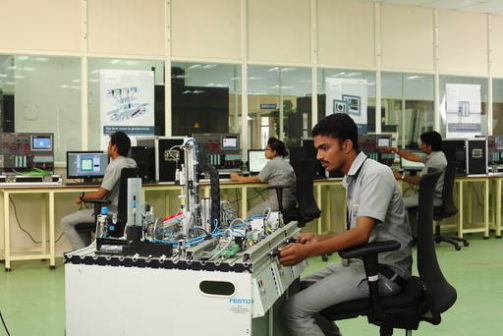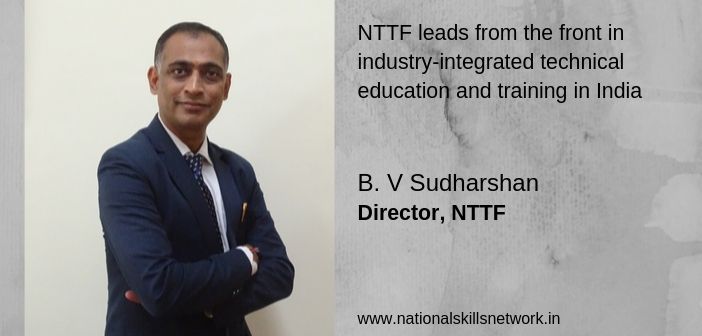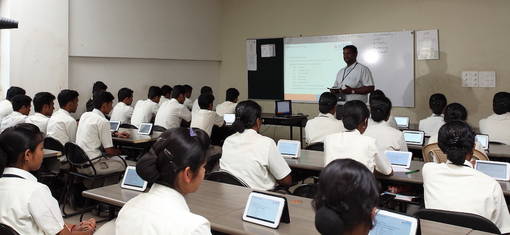Nettur Technical Training Foundation (NTTF) has been at the forefront of technical education and training in India with a wide range of exemplary job-oriented programs with over 30 centres across India. To know more about how NTTF has evolved successful models for industry-academia collaboration and options for higher education, we feature a Skill Talk with B V Sudharshan, Director, NTTF. Let’s read on to explore and engage with their initiatives.
Q: What has been the success model of NTTF in vocational training?
A: NTTF started with vocational training six decades ago. It was the first institute to start hands-on training program. Along with skill training, we also provide students with personality development in the curriculum. This way, through a holistic approach, NTTF has been successful in vocational training. We’ve also built a strong industry connect right from the beginning. We have industry partners with whose inputs we keep updating our syllabus. Apart from this, our faculty is exposed to the industry and get to work with them. And they bring the experience into our courses and curriculum.
 Whatever the industry is talking today, is already taught to our students. They are ready to work with the industries right from day one. This is the biggest advantage we have. Our alumni. across sectors have done tremendously well. This led to the growth of NTTF, mainly through word of mouth, industry acceptance and entrepreneurship of NTTF Alumni.
Whatever the industry is talking today, is already taught to our students. They are ready to work with the industries right from day one. This is the biggest advantage we have. Our alumni. across sectors have done tremendously well. This led to the growth of NTTF, mainly through word of mouth, industry acceptance and entrepreneurship of NTTF Alumni.
Q: How important do you think is the industry-academia collaboration in preparing for Industry 4.0?
A: Industry-academia collaboration is very important especially in today’s times of changing technology like Internet of Things (IoT), Artificial Intelligence (AI), and Machine Learning. So, to impart training in new technologies, we are actively working with industries. We have collaborated with Intel for IoT, where we have Intel curriculum and we provide joint certification from Intel and NTTF. Similarly, we are collaborated with Cisco for Cyber Security, AWS for Cloud Computing etc.
We are also working with FANUC to develop a practical model for people to adapt to changing technology. We are working with Bosch on understanding Industry 4.0 practices at their shop floor and develop a Training Module. We are developing a model with industry connect which can be easily replicable for MSMEs. We need to take lot of initiatives to work with Industries for new technology. With only theoretical knowledge one cannot teach everything. We need a strong industry Collaboration , know what’s going on the industry, only then the training is complete. Industry partnership will make training meaningful.
 Q: How did you mange so many partnerships with industry and long-term association with them? What are some of the best practices that NTTF has adopted?
Q: How did you mange so many partnerships with industry and long-term association with them? What are some of the best practices that NTTF has adopted?
A: When we talk about industry, people think industry should come to you. Rather, it’s the other way around. We need to go to the industry. We should be able to say what value an Institute can create for the industry. NTTF has good faculty base right now in many new technologies We also have a strong faculty development program, where whoever joins fresh in NTTF will undergoes 18-month rigorous training. This is adding value to the industry. Our pan- India presence also helps industries reach more people, help in making an impact and at the same time building a brand in the industry. We also invite industry partners to our events like convocation and new program launch. This way, it helps us in building long-term relationship with the industry.
 We take inputs from the industry and integrate them into our syllabus and curriculum. Also, since NTTF is a private institute it is easy to incorporate these changes into the curriculum. Which is a seamless process. However, our academic council meets twice a year, to approve the changes. This makes is easy to speed up the process.
We take inputs from the industry and integrate them into our syllabus and curriculum. Also, since NTTF is a private institute it is easy to incorporate these changes into the curriculum. Which is a seamless process. However, our academic council meets twice a year, to approve the changes. This makes is easy to speed up the process.
Skill India and other initiatives of Government of India have focussed on digital skills this year. What is your opinion on it? And do you have any suggestions?
Digital skills will cut across all the sectors; be it automation, data, or the AI, it will impact manufacturing, retail and many sectors. You can’t be complacent with one skill. Everybody needs to know how the technology is changing and how it is going to impact. Only the technical knowledge is not enough. Maybe, in five years from now everything will be digitised. So, people must have the basic knowledge of what’s happening around and how it is going to affect the business. For example, a product supervisor should not just know about the product but also know how to use the data. One should have analytical ability, to analyse the data and make good use of it. Though it is still the beginning, awareness on new technologies and digital literacy is necessary.
Related article: Technical training in consonance with the industry assures jobs and career growth – An interview with Namasivayam Reguraj, Managing Director, NTTF Read more: https://nationalskillsnetwork.in/technical-training-nttf/
What attracts students to NTTF, particularly through paid courses? How are you adding aspirational value in your training?
For the success of vocational training, interest and commitment is essential. Now, since there are CSR activities, government sponsorships involved, the main challenge is to motivate people to join. Good industry connect and with reasonably good salary is what attracts people to NTTF. We have about 20,000 students at given point of time, and all of them are placed. Even in our short-term vocational course, we add some best practices of our diploma program into it. Along with technical training, we also train the students on grooming and other aspects which make them industry ready. Because going forward, cognitive skills, analytical and networking skills will play an important role.
 Earlier, technology used to change may be in 10 years. But now, it changes every 3-5 years. Digital skills are going to change everything. Therefore, students should develop a hunger for learning. Whatever, he/she learns today, they’ll have to upskill it again in 3-5 years. In order to keep them motivated, we give a stipend to students who attends every day from fee we receive from government. This addresses our challenge of low attendance.We have also started Centre for Life Long Learning to inculcate the habit of learning new skills continuously.
Earlier, technology used to change may be in 10 years. But now, it changes every 3-5 years. Digital skills are going to change everything. Therefore, students should develop a hunger for learning. Whatever, he/she learns today, they’ll have to upskill it again in 3-5 years. In order to keep them motivated, we give a stipend to students who attends every day from fee we receive from government. This addresses our challenge of low attendance.We have also started Centre for Life Long Learning to inculcate the habit of learning new skills continuously.
Also, vocational training should get social acceptance. When they get certified for a job role through a Qualification Pack (QP), it should be acceptable across industries. QPs must be mentioned along with job role. Social stigma of making vocational training as a secondary stream of education must be removed. Only then more and more people will come and take this up.
As parents play a key role in deciding their child’s future, are there any steps taken by NTTF to make an impact on the mindset of parents?
When conduct Rope-In program, we invite parents. We talk about available opportunities – to get a job, get into an industry or to even become an entrepreneur. We also give them examples of many achievers and talk about success stories. NTTF Alumni’s come and address parents and students what they have learnt and how it has helped to build their career. We try to indicate that it is not the qualification but the skill that will take one forward. However, more needs to done on this front.













Comments 3